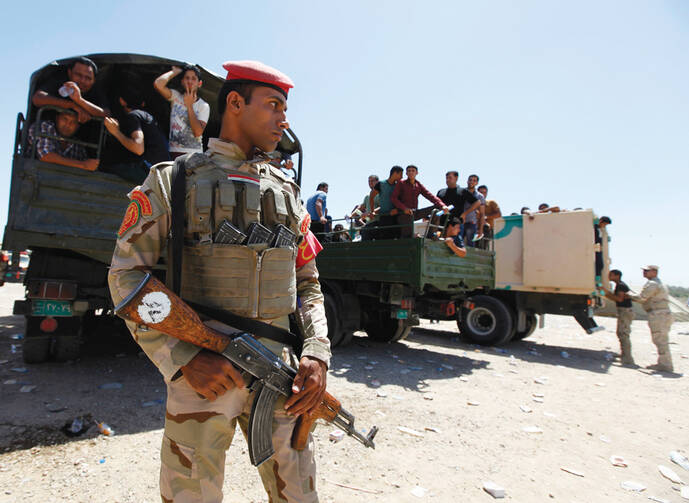The chairman of the U.S. bishops’ Committee on International Justice and Peace called for diplomatic measures rather than a U.S. military response to the crisis facing Iraq as Islamist militants gain ground. In a letter to Susan E. Rice, the U.S. national security adviser, Bishop Richard E. Pates of Des Moines, Iowa, called upon the United States to urge Iraqi political leaders to “form an inclusive government” so that people who feel they have no voice in the country’s affairs are included in its governance.
“Our nation bears a special responsibility toward the people of Iraq,” Bishop Pates wrote on June 19. “The U.S.-led invasion and occupation unleashed both sectarian conflicts and extremism in Iraq, two tragic unintended consequences that have profound and continuing repercussions for the people of Iraq.”
Iraq’s crisis was spawned by the rapid movement of thousands of armed members of the Islamic State of Iraq and Syria through much of northern Iraq. The militant organization has killed Muslims and Christians while functioning with military efficiency during its press toward Baghdad, the capital, during June.
“It is critical that all ethnic and religious groups are represented at the table of governance so that the common good of all is served,” Bishop Pates said. “Extremists have been exploiting the divisions born of exclusion and the weakening of the rule of law.” The fall of Mosul, Iraq’s second-largest city, to Islamist militants in early June sent half a million residents scurrying for safety. Church officials reported that virtually every Christian who was physically capable of doing so fled the city before the militants arrived.
Bishop Pates said diplomatic efforts also must be undertaken in neighboring Syria. He urged Rice and U.S. officials to work with other countries, particularly Iran, Russia, Saudi Arabia and “all responsible parties in Syria.”
“It is critical to obtain a ceasefire, initiate serious negotiations, provide impartial humanitarian assistance and encourage efforts to build an inclusive society in Syria,” Bishop Pates wrote. “These actions will help protect the rights of all citizens, including Christians and other minorities.”
Pax Christi USA also called for a “fully inclusive international diplomatic process” to address the burgeoning Iraqi crisis and the continuing violence in Syria rather than any military response by the United States or other countries. The Catholic peace organization urged the United Nations to initiate multilateral diplomacy involving organizations like the Arab League.
Sister Josie Chrosniak, a member of the Sisters of the Humility of Mary who chairs Pax Christi USA’s national council, told Catholic News Service that the challenges facing Iraq will be resolved only through nonviolent action and diplomacy. “As an organization committed to the belief in nonviolence we do continue to be saddened by all the violence in the world, but most especially at this time by the violence that is causing increased suffering to the people of Iraq,” Sister Chrosniak said.
Military intervention would only lead to more conflict, she added. “The more we fight, the more people will fight us. We really believe the only way for any kind of solution to be reached is through the United Nations. The U.N. has the ability to address the concerns for all the people in the area, all of the countries involved,” Sister Chrosniak explained.
In its statement, Pax Christi USA maintained that “U.S. military intervention will not achieve the peace and stability that the people of Iraq deserve.”
“A military solution—whether it includes air strikes or ground troops or an increase in the flow of weapons into Iraq—will only serve to increase the suffering of the Iraqi people, not alleviate it,” the statement said.








